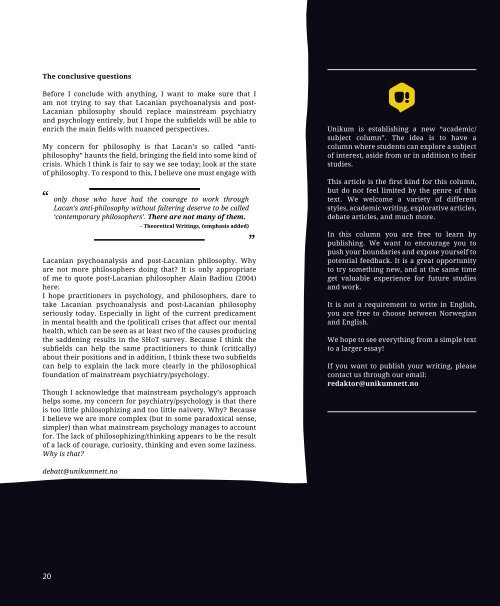Unikum 09 November Web
Create successful ePaper yourself
Turn your PDF publications into a flip-book with our unique Google optimized e-Paper software.
The conclusive questions<br />
Before I conclude with anything, I want to make sure that I<br />
am not trying to say that Lacanian psychoanalysis and post-<br />
Lacanian philosophy should replace mainstream psychiatry<br />
and psychology entirely, but I hope the subfields will be able to<br />
enrich the main fields with nuanced perspectives.<br />
My concern for philosophy is that Lacan’s so called “antiphilosophy”<br />
haunts the field, bringing the field into some kind of<br />
crisis. Which I think is fair to say we see today; look at the state<br />
of philosophy. To respond to this, I believe one must engage with<br />
“<br />
only those who have had the courage to work through<br />
Lacan’s anti-philosophy without faltering deserve to be called<br />
‘contemporary philosophers’. There are not many of them.<br />
– Theoretical Writings, (emphasis added)<br />
Lacanian psychoanalysis and post-Lacanian philosophy. Why<br />
are not more philosophers doing that? It is only appropriate<br />
of me to quote post-Lacanian philosopher Alain Badiou (2004)<br />
here:<br />
I hope practitioners in psychology, and philosophers, dare to<br />
take Lacanian psychoanalysis and post-Lacanian philosophy<br />
seriously today. Especially in light of the current predicament<br />
in mental health and the (political) crises that affect our mental<br />
health, which can be seen as at least two of the causes producing<br />
the saddening results in the SHoT survey. Because I think the<br />
subfields can help the same practitioners to think (critically)<br />
about their positions and in addition, I think these two subfields<br />
can help to explain the lack more clearly in the philosophical<br />
foundation of mainstream psychiatry/psychology.<br />
Though I acknowledge that mainstream psychology’s approach<br />
helps some, my concern for psychiatry/psychology is that there<br />
is too little philosophizing and too little naivety. Why? Because<br />
I believe we are more complex (but in some paradoxical sense,<br />
simpler) than what mainstream psychology manages to account<br />
for. The lack of philosophizing/thinking appears to be the result<br />
of a lack of courage, curiosity, thinking and even some laziness.<br />
Why is that?<br />
”<br />
<strong>Unikum</strong> is establishing a new “academic/<br />
subject column”. The idea is to have a<br />
column where students can explore a subject<br />
of interest, aside from or in addition to their<br />
studies.<br />
This article is the first kind for this column,<br />
but do not feel limited by the genre of this<br />
text. We welcome a variety of different<br />
styles, academic writing, explorative articles,<br />
debate articles, and much more.<br />
In this column you are free to learn by<br />
publishing. We want to encourage you to<br />
push your boundaries and expose yourself to<br />
potential feedback. It is a great opportunity<br />
to try something new, and at the same time<br />
get valuable experience for future studies<br />
and work.<br />
It is not a requirement to write in English,<br />
you are free to choose between Norwegian<br />
and English.<br />
We hope to see everything from a simple text<br />
to a larger essay!<br />
If you want to publish your writing, please<br />
contact us through our email:<br />
redaktor@unikumnett.no<br />
debatt@unikumnett.no<br />
20


















